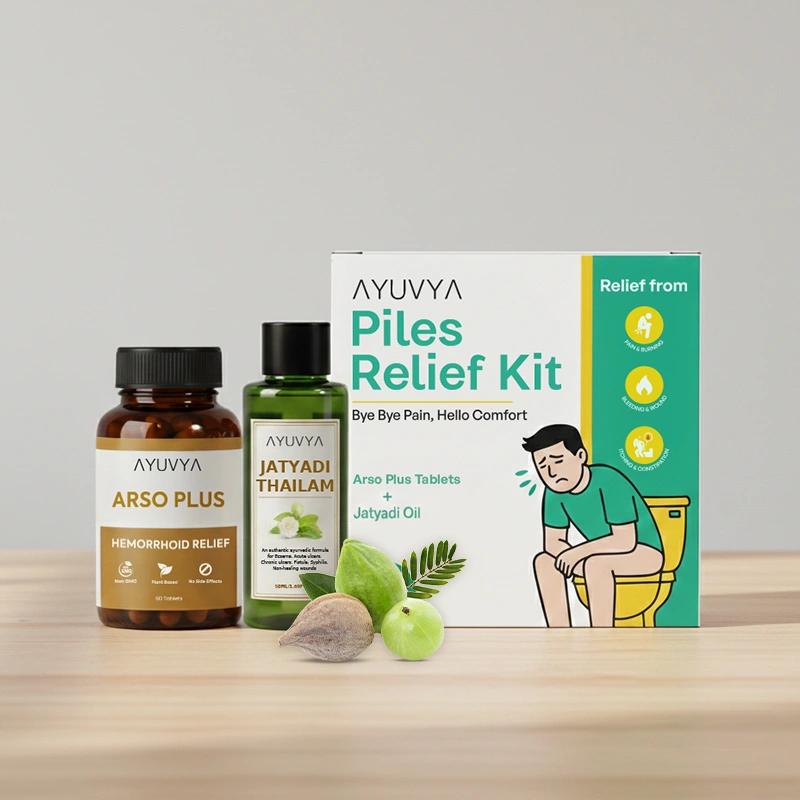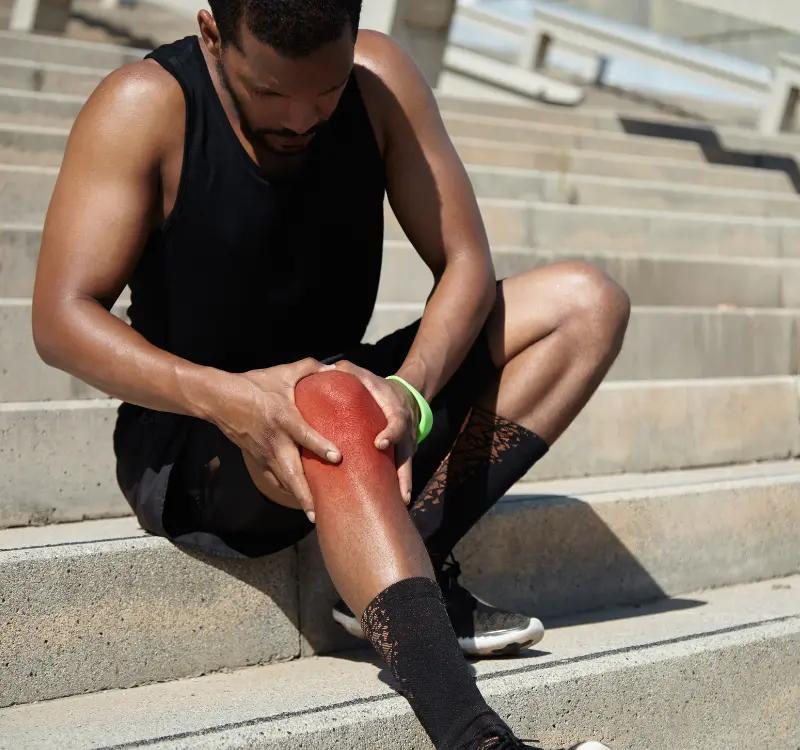Here Are The Best Ayurvedic Medicines To Treat Piles Naturally
Apr 24, 2024

Piles or hemorrhoids can be a painful and uncomfortable condition, often causing symptoms such as swelling, itching, and discomfort, especially during bowel movements. But with the help of Ayurveda, you can manage the symptoms of piles and reduce the chance of surgery. Ayurvedic remedy for piles is known to effectively reduce inflammation, ease pain, and promote healing. This article will help you to know the causes and how to get rid of piles.
Table of Contents:
- What are the Causes of Piles
- Causes of Piles According to Ayurveda
- Common Symptoms of Piles
- 5 Effective Herbs for Piles Treatment
- Useful Tips and Lifestyle Changes to Manage Piles and it’s Symptoms
- Conclusion
- FAQs
What are the Causes of Piles?
1. Straining during bowel movements: This is one of the most common causes. When you strain to pass stools, it puts pressure on the veins in your rectum and anus, leading to swelling and the formation of piles.
2. Chronic constipation: Regular constipation can lead to straining during bowel movements, which increases the risk of developing piles.
3. Prolonged sitting: Sitting for long periods, especially on the toilet, can increase the pressure on the veins in the anus and rectum, contributing to piles.
4. Heavy lifting: Regularly lifting heavy objects can strain the muscles and veins in your rectum and anus, leading to the development of piles.
5. Pregnancy: The increased pressure on the abdomen and hormonal changes during pregnancy can cause the veins in the rectum and anus to swell, leading to piles.
6. Obesity: Excess weight can increase pressure on the veins in the rectum and anus, contributing to the development of piles.
7. Low-fiber diet: A diet low in fiber can lead to constipation, which can increase the risk of developing piles.
8. Diarrhea: Chronic diarrhea can also lead to straining and increased pressure on the veins in the rectum and anus.
Causes of Piles According to Ayurveda
An imbalance in the body's doshas (Vata, Pitta, Kapha) can lead to digestive issues and subsequently piles. Each dosha has its own characteristics and imbalances can lead to various health issues, including digestive problems and piles.
Vata imbalance: When the balance of Vata is disturbed, it can lead to constipation and dry, hard stools. This increases the likelihood of straining during bowel movements, which can cause the veins in the rectum and anus to swell, leading to piles. Vata-type piles are often hard and dark in colour and are accompanied by acute pain and constipation.
Pitta imbalance: An imbalance in Pitta can lead to inflammation and bleeding, resulting in soft, reddish piles. Other symptoms may include fever, diarrhea, and excessive thirst.
Kapha imbalance: An excess of Kapha can lead to large, white, and smooth piles. Kapha-related piles may be associated with digestive issues.
To address piles, Ayurveda recommends dietary changes, herbal remedies, and lifestyle modifications to balance the doshas and improve digestive health.
Common Symptoms of Piles
The most common symptoms of piles are listed below:
1. Rectal Bleeding: Bright red blood during bowel movements, on toilet paper, or in the toilet bowl.
2. Swelling Around the Anus: Lumps or bulges near the anal opening, which may be painful or tender.
3. Itching or Irritation: Persistent itching or dhttps://ayuvya.com/product/ayurvedic-piles-care-jatyadi-oil-and-arso-tabletsiscomfort around the anus.
4. Pain or Discomfort: Pain, especially during or after bowel movements.
5. Leakage: Accidental leakage of stool or mucus from the anus.
6. Protrusion: Feeling of a lump or mass that may protrude from the anus during bowel movements and retract afterwards.
Moreover, patients with piles may also suffer from various health issues, such as anal fissures, skin infections, anaemia due to blood loss, urinary problems, and weakness.
5 Effective Herbs for Piles Treatment
Certain herbs are known for their healing properties, especially when it comes to treating piles. Here is how to treat piles without surgery in Ayurveda:
1. Triphala
This is a powerful combination of three fruits: Amalaki, Bibhitaki and Haritaki, and is known as the best ayurvedic medicine for piles. It has the ability to aid digestion and prevent constipation, which is crucial in managing piles.
2. Haritaki
This herb is known for its natural laxative effect, making it very useful for people suffering from piles. Haritaki helps in softening stools and promoting regular bowel movements, reducing the strain and pressure on the rectal area.
3. Amla
Amla is a rich source of vitamin C and antioxidants. It boosts the immune system and strengthens the digestive tract, helping to prevent and heal piles. Its anti-inflammatory properties also help in reducing the swelling and discomfort associated with piles.
4. Turmeric
Known for its powerful anti-inflammatory and antiseptic properties, turmeric can be very effective in treating piles. It helps to reduce inflammation, pain, and itching in the affected area.
5. Guggul
This sticky substance from the Commiphora mukul tree has been used in Ayurvedic medicine for centuries. Guggul is known for its anti-inflammatory and analgesic properties, making it useful in natural ingredients that can reduce the symptoms of piles. It can also reduce swelling and pain, and improve digestion.
Useful Tips and Lifestyle Changes to Manage Piles and it’s Symptoms
Dietary Changes
Eating the right foods can make a big difference. Add more fiber-rich foods to your meals, like fruits, vegetables, and whole grains. These help make bowel movements smoother and less painful. Try to stay away from spicy, fried, or processed foods, as they can make your condition worse.
Topical Treatments
Applying natural creams or ointments can soothe the affected area. Look for products that contain herbs like witch hazel, aloe vera, or turmeric, which are known for their calming properties.
Sitz Baths
Taking a warm bath can provide relief from itching and inflammation. Fill a tub with warm water and add some Epsom salt or herbal solutions, and sit in it for about 15-20 minutes.
Lifestyle Changes
Staying active is important. Regular exercise can help prevent constipation and reduce pressure on the veins in the lower rectum. Also, try to maintain a healthy weight and avoid sitting or standing for too long.
Hydration
Drinking plenty of water throughout the day keeps your stools soft, making them easier to pass.
Ayurvedic Therapies
Treatments like Panchakarma can cleanse the body and help restore balance.
Final Words
Thus, Ayurveda offers a safe and holistic approach to curing piles from their roots. By addressing the underlying imbalances in the body, Ayurvedic treatments not only provide relief from the symptoms of piles but also work to prevent their recurrence. With a combination of dietary changes, herbal remedies, lifestyle modifications, and therapies, Ayurveda can effectively treat piles, ensuring long-term health and well-being.
Frequently Asked Questions
Ghee, when consumed in moderation, can be beneficial for piles due to its anti-inflammatory properties and its ability to lubricate the intestines, easing bowel movements.
Yes, curd is good for piles as it contains probiotics that help maintain a healthy gut flora, aiding in digestion and preventing constipation, which can alleviate symptoms of piles.
For piles, it's best to avoid spicy foods, refined grains, processed foods, and foods low in fiber, as these can exacerbate symptoms and contribute to constipation.
Ashwagandha is not directly used for treating piles, but its stress-reducing and anti-inflammatory properties can indirectly support the overall treatment of piles by improving digestive health.
Ayurvedic medicines can effectively manage and reduce the symptoms of piles, but complete cure depends on the severity and individual response to treatment. Consulting with an Ayurvedic practitioner is recommended for a personalized approach.
The best treatment for piles varies depending on the severity. For mild cases, home remedies and lifestyle changes may suffice. For more severe cases, medical treatments like banding, sclerotherapy, or surgery may be necessary.
Yes, you can treat mild cases of piles at home using natural remedies like warm sitz baths, applying aloe vera gel, and eating a high-fiber diet to ease symptoms.
Triphala is considered one of the best Ayurvedic herbs for piles. It helps in improving digestion, relieving constipation, and reducing inflammation, which are key factors in managing piles.















